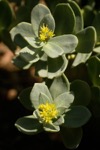| Scientific: | Rhodiola rosea |
|---|---|
| Other: | Rhodiola, Roseroot |
| Family: | Crassulaceae |
Rhodiola, also called “Roseroot ”, grows in harsh cold northern climates, like those found in the arctic and at high altitudes. Historically, it has been used in Europe, Asia and Russia as an adaptogen, to help people cope with stress, and also to relieve fatigue.
Preliminary clinical trials support these indications. Rhodiola is often classified as a “second generation” adaptogen because its mechanism is different than other adaptogens (e.g. ginsengs, withania, astralagus). Phyto-chemically, rhodiola is different from other adaptogens because it contains tyrosol glycosides (e.g. salidroside, rosin) that appear to modulate various neurotransmitters involved in mood (e.g. serotonin, dopamine) and stress (epinephrine, norepinephrine). In addition, rhodiola may affect opioid receptors and has historically been used to help with opioid addiction.
In addition to being used to treat stress and fatigue, research studies suggest that rhodiola may help with anxiety and depression. Pharmacological studies have suggested that rhodiola inhibits enzymes that affect neurotransmitters, including monoamine oxidase (MAO) and catechol-0-methyltransferace inhibitor (COMT). This mechanism likely contributes to its antidepressant action and thus it should not be combined with other antidepressants without consulting a healthcare provider.
Because of its effects on neurotransmitters, rhodiola has the potential to improve mental function and concentration.
Second generation adaptogen. Primary active constituents are not steroidal glycosides but rather phenylpropanoid derivatives whose mechanism of action is different. Brain tonic; rosavins (tyrosol derivatives) modulate the catecholamines (epinephrine, norepinephrine, dopamine), as well as serotonin and acetylcholine.
Endocrine
• stress
• adrenal fatigue
• chronic fatigue syndrome (CFS)
• hypothyroidism
• fibromyalgia
CNS
• over-stimulated states
- insomnia
• mood disturbances
- depression
- anxiety
• poor cognition - attention deficit hyperactivity disorder (ADHD, ADD)
• neurodegenerative disorders - Parkinson's disease- Alzheimer's disease
Cardiovascular
• over-stimulated heart - arrhythmias- hypertension
Reproduction
• sexual dysfunction related to stress
- erectile dysfunction (ED)
- menstrual complaints
- amenorrhea
• infertility
Exercise
• athletic performance
• decreased endurance
• prolonged recovery time between high-intensity exercise sessions
• Adaptogen
• Tonic
• Stimulant
• Sedative
• Brain Tonic
• Nootropic
• Antidepressant
• Cardiotonic
• Cardioprotective
• Antiarrhythmic
• Antihypertensive
• Anticancer
• Antiinflammatory
• Antiaging
• Phenylpropanoid Derivatives (Tyrosol Glyscosides, Salidroside)
• Flavonoids
• Tincture (1:4) 2-3 ml tid
• Capsules (3% rosavins): 100-600mg qd
• Decoction (dried herb): 1-2 tsp tid
Generally considered safe when used as indicated.
Side effects: Insomnia (rare) if taken in the evening.
Barnes J, Anderson LA, Phillipson JD. Herbal Medicines, 3rd ed. London: Pharmaceutical Press, 2007.
Bone K. Principles and Practice of Phytotherapy. Edinburgh: Churchill Livingstone, 2000.
Bone K. A Clinical Guide to Blending Liquid Herbs: Herbal Formulations for the Individual Patient. St Louis, MO: Churchill Livingstone, 2003.
Brinker F. The Toxicology of Botanical Medicines, 3rd ed. Sandy, Oregon: Eclectic Medical Publications, 2000.
Felter HW, Lloyd JU. King's American Dispensatory. 1898. http://www.ibiblio.org/herbmed/eclectic/kings/main.html. Accessed: August 19, 2006.
Hoffman D. Medical Herbalism. Rochester, Vermont: Healing Arts Press, 2003.
Weiss RF. Herbal Medicine. Beaconsfield, England: Beaconsfield Publishers Ltd, 1988.
Williamson EM, ed. Major Herbs of Ayurveda. Edinburgh: Churchill Livingstone, 2002
Disclaimer: This content is subject to change. The information is intended to inform and educate; it does not replace the medical evaluation, advice, diagnosis or treatment by a healthcare professional. www.nhpassist.com © 2014 NDAssist Inc. and/or its affiliates. All rights reserved.

|
Rhodiola or Roseroot
SummaryRhodiola, also called “Roseroot ”, grows in harsh cold northern climates, like those found in the arctic and at high altitudes. Historically, it has been used in Europe, Asia and Russia as an adaptogen, to help people cope with stress, and also to relieve fatigue. IndicationsSign in requiredActionsSign in requiredConstituentsSign in requiredPosologySign in requiredSafetySign in requiredReferencesSign in required |
|---|